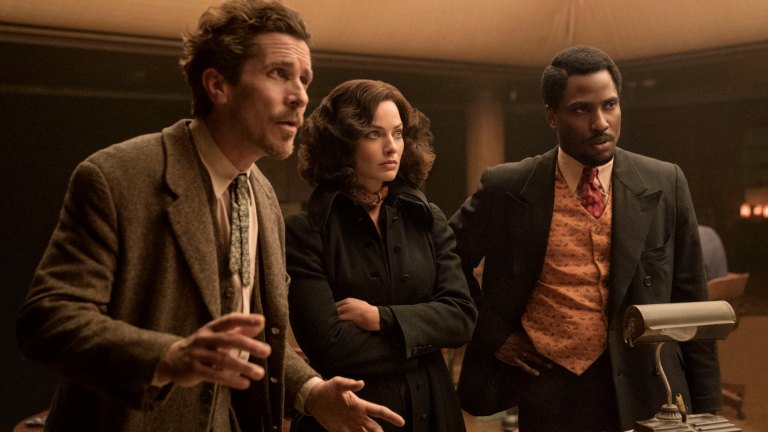Amsterdam Review: When Christian Bale Can’t Save You
David O. Russell’s Amsterdam rolls out one huge name after another: Bale, Robbie, Washington, Malek, De Niro, Taylor-Joy. So why does it all feel like self-parody?

As quirky, messy, and undisciplined as the work of director David O. Russell can be, when he nails his material—which to be fair is more often than not—he can really get at the heart of human relationships and bigger thematic concerns with great humor and empathy. See Flirting with Disaster, Three Kings, and a good chunk of American Hustle, for prime examples of this. On the other hand, when Russell drops the ball (Joy, anyone?), the results can be tedious at best and unbearable at worst. His first film in seven years, Amsterdam, falls somewhere on the spectrum between the two, and probably more toward tedious, if only because one’s interest is sustained by the movie’s incredible cast and less by the convoluted and incoherent story that they’re working through.
Yet even that cast, which includes (deep breath) Christian Bale, John David Washington, Margot Robbie, Anya Taylor-Joy, Robert De Niro, Rami Malek, Mike Myers, Michael Shannon, Zoe Saldana, Chris Rock, Taylor Swift (!), Alessandro Nivola, and Matthias Schoenaerts, is trotted out one by one as if on the runway at a fashion show, with Russell more interested in showing you what a glittering ensemble he’s gathered than actually having them create (for the most part) characters that live and breathe.
“A lot of this actually happened,” a title card says right at the beginning of the film, Russell’s way of letting himself off the hook in terms of an articulate narrative. The film is at least partially inspired by a conspiracy called the Business Plot, which involved a plan to overthrow the United States government. That’s code for the director letting us know that his film is relevant to today, but you can’t really tell from the ramshackle way it’s all handled.
The early hints of that plan are first uncovered in New York City circa 1933 by Burt Berendson (Bale) and Harold Woodsman (Washington), a doctor and lawyer duo who previously became friends while serving together in World War I. Berendson lost an eye in the conflict and primarily treats veterans, often with the use of sketchy or experimental drugs. He and Woodsman act as a team to help those in trouble or with no money.
Burt is preparing for a dinner date with his estranged wife Beatrice (Andrea Riseborough) and also looking forward to the annual veterans’ gala reunion when he is summoned by Harold to perform an autopsy. The body is that of Bill Meekins (Ed Begley Jr.), the general who brought them together and was scheduled to be the featured speaker at their gala. His daughter Liz (Swift) believes her father died suspiciously and nobody else wants to help her.
Events escalate at a rapid pace after that, with Burt and Harold finding themselves suddenly implicated in a larger murder mystery, and that’s when the whole movie jerks backward in time to 1918, to show us how Harold and Burt met, and also how they came upon the third member of their strange trio of friends, Valerie Voze (Robbie), an eccentric nurse who treats the boys’ injuries and then takes them to recover in Amsterdam, where the three of them briefly enjoy a kind of creative, spiritual, and physical freedom that they’ve never known before or since.
Eventually, the trio meets again in 1933, and together unpack a web of intrigue that involves some of the country’s most privileged, wealthy families, American and British intelligence, a secret society, rumblings of Antisemitism, and a still-living war hero general (De Niro).
We think that covers it. It’s hard to tell, since Russell’s movie swings as wildly between plot threads and tonal shifts as his camera does through his exquisitely detailed period settings. Russell trots out that cast, whirls that camera around them constantly, and then often leaves them to flounder. The entire third act of the film plays as if they were literally making it up on the soundstage as they went along.
All this undercuts any deeper meaning that the director may have wanted to signify, as well as the work of the actors. Some, like Schoenaerts and especially Nivola as perhaps the world’s dumbest cop, provide welcome comic relief. Others, like Shannon and Myers, are simply collections of tics in suits. Our three main leads do the best that they can, but Bale is left to navigate between moments of rich texture and near self-parody, while Robbie never seems to find the right angle from which to approach Valerie.
The effect is one of distance; Russell may want us to love these characters and be invested in the bigger story they’re telling, but he lets his own worst habits get in the way, keeping us at arm’s length the entire time. Plus the two halves of the equation—the plot at the heart of the 1933 story and the metaphorical value of Amsterdam—never quite gel together. We can’t say we were totally bored during the movie, but we were frequently disinterested, the last thing we expect that David O. Russell wanted.
Amsterdam is playing in theaters now.
